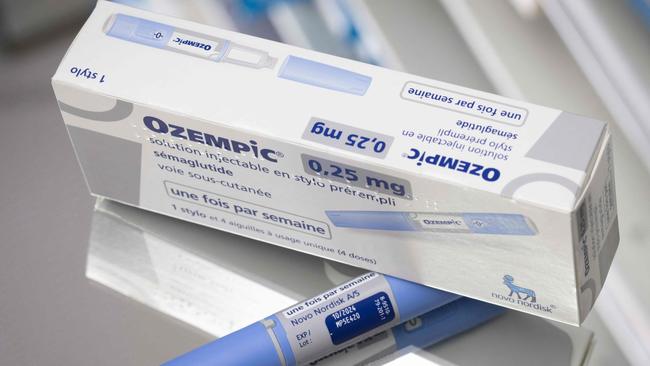Reality of losing weight with new revolutionary drugs like Ozempic
It’s being heralded as the next big thing in weight loss but anyone considering taking these revolutionary new drugs needs to proceed with caution.

Health
Don't miss out on the headlines from Health. Followed categories will be added to My News.
There are new weight loss drugs and it seems that everyone from celebrities to social media stars are seeking them out to transform their bodies into the lithe, lean frames previously reserved for those sworn to avoid carbohydrates indefinitely.
And, as is the case with trending news topics, it seems that everyone has an opinion on these drugs, whether they’re qualified to be commentating on them, or not.
So, what exactly are these new weight loss drugs?
The semaglutides sold under the brands Ozempic and Wegovy are revolutionising the management of overweight and obesity around the world.
In theory, weight loss appears to come down to a simple equation: Eat fewer calories than you burn and you lose weight.

There is a common misconception that if you fail to lose weight you must be eating too much, moving too little or cheating on your diet.
Or, if you need to resort to weight loss medication, you simply lack will power and should be able to do it naturally without ‘cheating’ and injecting yourself.
As a dietitian who has worked primarily in weight management for more than 20 years, I can firmly say that the reality, like most things in life, is not so straightforward.
The truth about weight loss
Weight loss, especially significant weight loss of 20 or more kilos, is extremely difficult, which is relatively evident given that more people in Australia or overweight than not.
The human body does not like to lose weight, and rather fights tooth and nail to keep excessive weight on. This is why it is so easy to regain weight after you have successfully lost it.
Significant weight gain can also result in profound hormonal shifts that make it increasingly difficult to lose weight, and increasingly easy to keep overeating and gaining it. The hormone commonly driving this cycle is insulin, the central regulator of both glucose and fat metabolism in the body.

When insulin stops working altogether, you get Type 2 diabetes. The early stages of diabetes can be detected by assessing if insulin resistance is present, the scenario in which insulin is working overtime to regulate both glucose, and fat metabolism, and failing dismally.
Why are these drugs so powerful?
The reason that the latest ‘weight loss’ drugs are so powerful is that they are the first type of drugs available that not only help to inhibit the rampant appetite that drives overeating and weight gain in those who are overweight, but they also help to increase insulin production, which for those battling with insulin resistance is groundbreaking.
When insulin is taken care of, suddenly those who have gained significant amounts of weight courtesy of poor acting insulin, are no longer hungry, so they can be diet compliant for the extended periods of time required to lose upwards of 20 or 30 kilos.
Plus, an increase in overall insulin production means that glucose and fat metabolism becomes more tightly regulated, as it naturally should be, and weight loss can result as it normally would when calorie intake is lower than output.
These drugs are not a quick fix
Using the drug is not cheating. Rather, these drugs are the first of their kinds that specifically target the metabolic dysfunction that has made weight loss so difficult for so many impacted with PCOS, pre-diabetes and high insulin levels for many years.
These drugs are also not ‘get out of jail free’ cards – if you do not eat well, and respond to your significantly reduced appetite by eating substantially less, as well as exercise as we all should for an hour a day, users will not lose all the excessive weight.

If diet and exercise is not maintained long term, weight will be regained. These drugs are a tool to support positive lifestyle change, not a magic bullet.
Who do they work for?
It may come as a surprise to hear that it’s not the morbidly obese or diabetic population these drugs have the most benefit for. In many of these cases, the habits underlying the obesity, or the severity of diabetes is too advanced to reverse it, or support significant weight loss. Rather, for those who already exercise, eat relatively well but still struggle with the 10-20kg that has crept on in the menopausal years, or for those already at high risk of diabetes, or with high insulin levels, these drugs can be the helping hand that gets the hormones under control that make appetite control very challenging.
For these motivated individuals, not only can these drugs reverse their insulin resistance but could prevent Type 2 diabetes long term.
The downside
These drugs are not a quick fix or easy way out. At the same time, using the drug is not cheating. Rather, these drugs are the first of their kinds that specifically target the metabolic dysfunction that has made weight loss so difficult for so many impacted with PCOS, pre-diabetes and high insulin levels for many years.
In saying that, there are a number of potential downsides that need to be considered. Firstly, weight loss medication is expensive, with the costs reaching up to $600 a month for some prescriptions, making it an unaffordable option for many.
Like all medications, there too may be side effects including constipation, nausea and pain around the injecting site. Long term there may also be an increased risk of developing thyroid cancer and pancreatitis, and for this reason such medications should always be combined with regular medical supervision.
Finally, but perhaps most importantly, they will only work to their full potential, and ultimately keep the weight off long term, in conjunction with a long-term commitment to eating well and exercising daily.
These drugs are a tool to support positive lifestyle change, not a magic bullet. It suggests that diet and exercise remains a good starting point for anyone wanting to lose weight, and keep it off, for good.
Ozempic has been included in the Australian Register of Therapeutic Goods (the ARTG) for the treatment of type 2 diabetes. This means that the medicine has been evaluated by the TGA for its safety, quality and efficacy for that indication only.
Susie Burrell is a dietitian and nutritionist and holds a Master’s degree in coaching psychology.
If you are considering losing weight then you should talk to your GP for advice.
Originally published as Reality of losing weight with new revolutionary drugs like Ozempic





